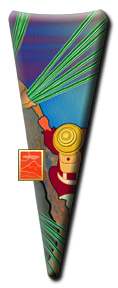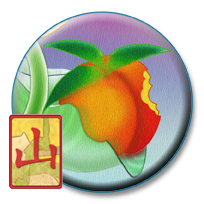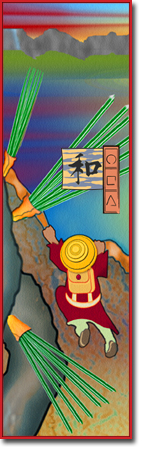On The Way: The Daily Zen Journal
Great Doubt
Boshan (1575-1630)
Exhortations for Those Who Don’t Raise Doubt
In Zen practice, the essential point is to rouse doubt. What is this doubt? When you are born, for example, where do you come from? You cannot help but remain in doubt about this. When you die, where do you go? Again, you cannot help but remain in doubt.
Since you cannot pierce this barrier of life and death, suddenly doubt will coalesce right before your eyes. Try to put it down, you cannot; try to push it away, you cannot. Eventually you will break through this doubt block and realize what a worthless notion life and death is—ha! As the old worthies said, “Great doubt, great awakening; no doubt, no awakening.”

The Disease of Intellect
If you’re unable to rouse doubt when practicing Zen, you may seek intellectual understanding through the written word. Stringing together with a single thread the various phrases and teachings of buddhas and patriarchs, you stamp them all with one seal. If a koan is brought up, you are quick to give your interpretation. Unable to rouse your own doubt concerning the koan, you don’t like it when someone probes you with serious questions. All this is simply your wavering mind; it is not Zen.
You may respond at once to questions by raising a finger or showing a fist. Taking up an ink brush, you promptly pen a verse to show off, hoping to guide unwitting students to your level. Fascinated with all this, you refer to it as the gate to enlightenment. You don’t realize that such karmic consciousness is precisely what prevents this doubt from arising.
If only you would straight off see the error of your ways, then you should once and for all let go of all and seek out a good teacher or Dharma friend to help you find an entrance. If not, your wavering mind will prevail, you’ll become as if demon-possessed, and release will be very difficult.
The Disease of Quiet Meditation
If you’re unable to rouse doubt when practicing Zen, you may develop an aversion to the world of conditions. Thus, you escape to a quiet place and sink into zazen meditation. Empowered by this, you find it quite fascinating. When you have to get up and do something, however, you dislike it. This too is simply your wavering mind; it is not Zen.

Sitting long in zazen, sunk in quietness; within this mystic darkness the senses fuse, objects and opposition disappear. Any contact with the world and you feel uneasy with your loss of freedom: hearing sounds or seeing sights, you’re gripped by fear. In the end, you waste a lifetime of practice in vain.
All because from the first, you failed to rouse this doubt—thus, you did not seek out a true guide or trust one. Instead, you stubbornly sit self-satisfied in your quiet hole. Even if you meet a good teacher or Dharma friend, if you don’t immediately recognize your error, innumerable buddhas may appear and preach the Dharma, but they won’t be able to save you.
The Disease of Suppression
If you’re unable to rouse doubt when practicing Zen, you may suppress emotions and discriminating consciousness so that no delusions can arise, then dwell in this apparently calm and lucid state. But you fail to thoroughly break through the root source of consciousness and instead dwell on its immaculateness.
Even though you may practice and understand everything from within this apparently pure and lucid state, once you encounter someone who points out your failure, then emotions and discriminating consciousness pop up like a gourd that was pushed under water. This too is simply your wavering mind: it is not Zen.
And all this because from the time you first took up a koan you failed to rouse this doubt. Even if you could suppress all delusions so that they no longer arise, it would be like trying to press down the grass with a stone—delusions will just grow around it.
And if you fail to do so, when in contact with the world of conditions, karmic consciousness will be stirred up. Even if you do actually cut off and put a stop to all karmic consciousness, that is falling into the heretical path of dead emptiness.
Then in the immaculate state that is produced, you convince yourself you’ve attained sainthood or enlightenment. Continue in this way and you will become arrogant; attached to this state, you will become as if demon-possessed. Entangled in the world and deluding others with your ignorance, you end up committing serious offenses, betraying the trust others have in the Dharma, and obstructing the path of awakening.

The Disease of Emptiness
If you’re unable to rouse doubt when practicing Zen, you may come to regard the physical and mental worlds as utterly emptied, with nothing at all to cling to and nothing to hold on to. Unable to discern your own body and mind or the world around you, denying inner and outer, you make everything into one emptiness.
Then you believe this emptying to be Zen, and the one who emptied it all to be a buddha. You imagine that the four postures of going, staying, sitting, and reclining are done within emptiness. This too is simply your wavering mind; it is not Zen.
Continuing in this way you end up in false emptiness, sunk in dark ignorance. Attached to it, you become as if demon-possessed and proclaim that you’ve attained enlightenment. All because you fail to realize that what you’re doing has nothing to do with true Zen inquiry.
If you genuinely inquire, with one koan you’d rouse this doubt and wield it as a razor-sharp sword—whoever comes in contact with its blade will be annihilated. Otherwise, even though you may reach a state of emptiness where no thoughts arise, it is still ignorance and far from final.
The Disease of Speculation
If you’re unable to rouse doubt when practicing Zen, you may end up speculating with your karmic consciousness over the koans of old, sloppily scratching the surface. Then you declare it to be the whole truth, or at least half, as absolute, as relative, this as lord and that as vassal, unity attained, clear and simple words, and so on, all the while praising yourself for your superior understanding.
Even if you could interpret and explain away each and every one, spewing out the words of old as your own, this too is simply your wavering mind; it is not Zen.
You don’t realize that you’re merely taking the words and phrases of old and chewing them like balled up cotton thread, unable to either swallow them or spit them out. How can such things create paths of liberation for others? How can they lead others to genuine insight?
On the other hand, if you rouse this doubt and throw yourself into it, then without waiting until the end of your life, karmic consciousness will cease of its own accord and entangling interpretations will naturally be put to rest.
Boshan (1575-1630)
Sourced from Great Doubt – Practicing Zen in the World translated by Jeff Shore 2016





We are not used to being called up short so continuously as Boshan does for us. We have all read wonderful enlightenment stories in Zen and gotten to know the colorful characters of old. We have learned the Bodhisattva vows and techniques of meditation; how often, though, has a mirror-like this been placed before us in real life?
Many of us have gotten soft in this “let’s play everybody wins” environment of the modern world. Few can listen to where they have gone off track, never having developed the mind of “equal in success or failure” which allows one to truly hear. Most want to hear where they are excelling in life rather than what they are missing. How else can we learn though?
Even if you could suppress all delusions so that they no longer arise, it would be like trying to press down the grass with a stone—delusions will just grow around it.
There are many traps in practice; Boshan is adept at pointing out these potholes for us. For those who practice alone, to clearly see what we are missing or where we are getting carried away is profoundly difficult. How else can we steer through a life of practice?
In the West the quote “I only know that I know nothing” which is attributed to Socrates but not found in the writings, is a safe place to reside. In Zen, it is akin to “beginner’s mind” which is empty and not knowing before it becomes filled with the concepts and dogma of any teaching.
Whatever we use as a reminder of how little we understand, it becomes the doorway to true wisdom.
May we remain open on the Way!
Elana, scribe for Daily Zen